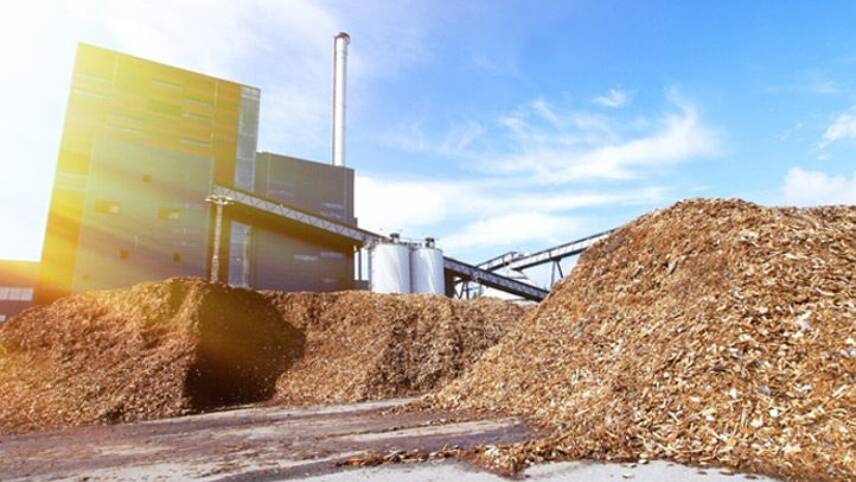Register for free and continue reading
Join our growing army of changemakers and get unlimited access to our premium content

The report highlights the potential environmental impact of scaling up biomass supply chains
That is according to a new report from Chatham House’s energy, environment and resources department.
Entitled ‘Net-Zero and Beyond’, the report analyses the potential unintended consequences of scaling up BECCS in the UK and assesses the extent to which the technologies could deliver true and sustainable decarbonisation to the energy sector.
BECCS has received a swathe of Government support and media coverage in recent times, both in the build-up to the ratification of the UK’s 2050 net-zero goal, and after its implementation. Supporters of the technologies point out that biomass, unlike gas or other fossil fuels, is renewable, and that it is produces less emissions when burned. If these emissions can be captured for storage and reuse, the process can become carbon neutral or even carbon negative, firms including Drax have claimed.
Drax’s existing CCUS array, which is being used in partnership with C-Capture, first began capturing carbon in February at the firm’s biomass facility in North Yorkshire. The firm is planning to scale up its carbon capture arrays in line with a commitment to become net-zero by 2030 and to co-create a net-zero industrial hub, including carbon capture, with National Grid and Equinor.
The UK Government has provided Drax and other BECCS-positive firms with much support in recent months, particularly after an Energy Technologies Institute (ETI) analysis explaining how BECCS could deliver roughly 55 million tonnes of net negative emissions a year in the UK – approximately half the nation’s emissions target – by the 2050s.
The Chatham House report, however, warns that BECCS is “no silver bullet” for a net-zero energy sector. It claims that there has not been enough research into the likely energy output of BECCS or the environmental impacts of scaling up biomass supply chains, making it difficult to determine whether BECCS systems can be carbon-neutral across the lifecycle.
According to the report, deployment of BECCS at the scales assumed by the UK’s modelling, on a global scale, would consume land equivalent to that currently accounted for by cropland. This could pose problems for food security, result in biodiversity loss and hamper plans to re-assess land-use in line with net-zero, Chatham House concludes. On the latter, the IPCC estimates that humanity currently uses 72% of the Earth’s ice-free land surface, predominantly for agriculture – and that 23% of all man-made GHG emissions in history stemmed land-use.
Chatham House claims that failures to account for biomass supply chain emissions undermine the assumption that BECCS systems are inherently carbon-neutral. The NGO is therefore calling for stricter sustainability requirements for feedstock.
This call to action comes after plaintiffs from six countries filed a lawsuit with the European General Court in Luxembourg last year, claiming that forest-grown wood shouldn’t be counted as a source of renewable energy under the EU’s 2018 Renewable Energy Directive (RED) II.
Chatham House is also warning that policymakers are failing to factor the slow progress in bringing BECCS technologies to maturity into their net-zero plans. The body’s report highlights the fact that, as of December 2019, there were only 18 large-scale CCS facilities in operation worldwide, with three of them having been online less than a year.
“On the one hand, as clearly evidenced by the latest IPCC assessments, it is becoming increasingly difficult to foresee the Paris Agreement targets being achieved without rapid scale-up in deployment of [carbon dioxide removal] solutions; emission abatement efforts are not progressing anywhere near rapidly enough to engender confidence that these alone will avoid global overshooting of emissions targets,” the report concludes.
“On the other hand… [BECCS] deployed at scale is unproven, and reliance on such technology is a major risk in the ability to limit warming to 1.5C.”
The road ahead
The Government is expected to allocate at least £800m to CCS this year, as promised in the Conservative Party manifesto. This funding could be announced at the Budget this spring or at the Autumn Statement.
While it is still developing shorter-term policy supports for the energy sector in line with the 2050 net-zero target, the Government has vowed to take the Committee on Climate Change’s (CCC) recommendations, including an assertation that CCS at scale is “not optional”.
Plans to place new limits on the amount of carbon that can be emitted from electricity generating sites are currently under consultation. The plans aim to speed up the coal phase-out through to the 2025 deadline, incentivise the shift to renewables and boost CCS use across the gas network. A separate consultation is exploring how UK fossil fuel plants can be repurposed and used for CCS as they are phased out.
These policy moves stand in stark contrast to previous approaches. In 2015, ministers closed a £1bn CCS competition fund.
In its report, Chatham House includes several recommendations for the future development of policy supports for CCS. It urges the Government to prioritise decarbonisation across carbon-intensive sectors and to reshape its land-use strategies in the first instance and to ensure that all BECCS decisions are only made after full considerations of all alternatives, both technology-based and nature-based.
“The danger at the moment is that policymakers are ‘sleepwalking towards BECCS’ simply because most models incorporate it – or, almost as bad, it may be that policymakers are simply ignoring the need for any meaningful action on carbon dioxide removal as a whole,” the report concludes.
Sarah George


And how is shipping wood pellets halfway around the world in oil powered cargo ships "net zero"? Not to mention the petrol used to power the chainsaws, the diesel to transport the logs from forest to sawmill then from sawmill to port?
Biomass is the biggest Green con out